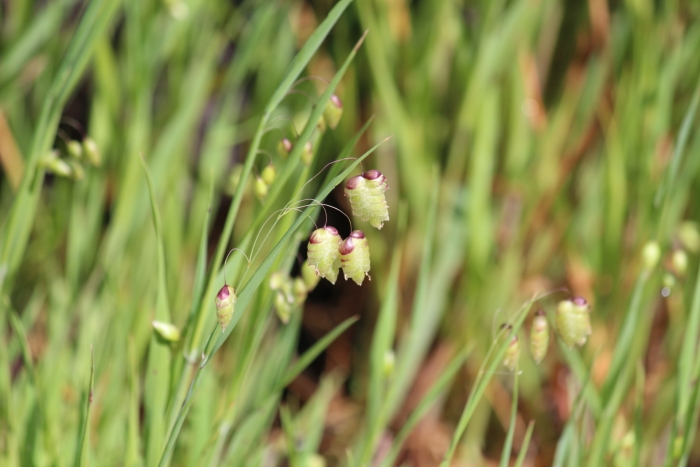Big Quaking Grass
(Briza maxima)
Big Quaking Grass (Briza maxima)
/
/

© Noeleen du Toit
CC BY-SA 4.0
Image By:
© Noeleen du Toit
Recorded By:
Copyright:
CC BY-SA 4.0
Copyright Notice:
Photo by: © Noeleen du Toit | License Type: CC BY-SA 4.0 | License URL: http://creativecommons.org/licenses/by-sa/4.0/ | Uploader: anibotani | Publisher: iNaturalist |












Estimated Native Range
Summary
Briza maxima, commonly known as big quaking grass, is an annual herb native to grasslands and open areas in the Mediterranean region, including Northern Africa, Western Asia, and Southern Europe. It has become naturalized in various parts of the world, such as the British Isles, the Azores, Australasia, the western United States, Central and South America, and Hawaii. This grass typically grows to a height of 12 to 24 inches (30 to 60 centimeters) and features delicate, nodding flower heads that are highly ornamental. The flower heads are large, airy, and heart-shaped, with a green to purple hue, blooming in late spring to early summer. The flowers are quite showy and are often used in dried flower arrangements due to their unique appearance and ability to retain their shape and color when dried.
Big quaking grass is valued for its distinctive, quivering flower heads that add movement and texture to garden designs. It is often used in meadow plantings, as an accent in borders, and for naturalistic landscaping. It prefers full sun to part shade and thrives in well-drained soils. While it is drought-tolerant once established, it benefits from regular watering during prolonged dry periods. It is generally low-maintenance, but it can self-seed prolifically under favorable conditions. Gardeners should be aware of its potential to become invasive outside its native range and take steps to control its spread if necessary.CC BY-SA 4.0
Big quaking grass is valued for its distinctive, quivering flower heads that add movement and texture to garden designs. It is often used in meadow plantings, as an accent in borders, and for naturalistic landscaping. It prefers full sun to part shade and thrives in well-drained soils. While it is drought-tolerant once established, it benefits from regular watering during prolonged dry periods. It is generally low-maintenance, but it can self-seed prolifically under favorable conditions. Gardeners should be aware of its potential to become invasive outside its native range and take steps to control its spread if necessary.CC BY-SA 4.0
Plant Description
- Plant Type: Grass
- Height: 1.5-2.5 feet
- Width: 1-2 feet
- Growth Rate: Moderate, Rapid
- Flower Color: N/A
- Flowering Season: Spring, Summer
- Leaf Retention: Deciduous
Growth Requirements
- Sun: Full Sun, Part Shade
- Water: Medium
- Drainage: Medium, Slow
Common Uses
Border Plant, Drought Tolerant, Low Maintenance
Natural Habitat
Native to grasslands and open areas in the Mediterranean region
Other Names
Common Names: Giant Quaking Grass, Greater Quaking-Grass, Blowfly Grass, Da Ling Feng Cao, Great Quaking Grass, Large Quaking Grass, Quaking Grass
Scientific Names: , Briza maxima, Briza capensis, Briza dalmatica, Briza gracilescens, Briza grandis, Briza major, Briza maxima f. concolor, Briza maxima f. discolor, Briza maxima f. rubra
GBIF Accepted Name: